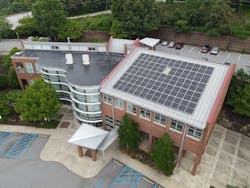Solar array completed at University of North Carolina Asheville campus
Solar installer Renu Energy Solutions has completed a new 64-panel solar installation at the University of North Carolina Asheville (UNC Asheville).
The solar array is expected to provide 37,000 kWh for the grid infrastructure at the university. It will offset about 30 tons of CO2 emissions annually for the campus and support the university’s energy efficiency and sustainability standards.
“The Reuter Center solar installation doubled UNC Asheville’s solar power production and was our first renewable energy project since committing to carbon neutrality by 2050," UNC Asheville’s Co-Director of Sustainability Jackie Hamstead said. "In addition to the climate impacts, this project will offset $920,000 in utility costs for the university over the life of the system.”
This installation and the solar installation Renu completed in May at New Belgium Brewing are part of the firm’s efforts to bring solar to the Asheville community.
UNC Asheville is the only liberal arts and sciences campus in the University of North Carolina system. Situated in the Blue Ridge Mountains, the campus is home to more than 3,000 undergraduate students and hundreds of faculty members.
About the Author
EnergyTech Staff
Rod Walton is head of content for EnergyTech.com. He has spent 17 years covering the energy industry as a newspaper and trade journalist.
Walton formerly was energy writer and business editor at the Tulsa World. Later, he spent six years covering the electricity power sector for Pennwell and Clarion Events. He joined Endeavor and EnergyTech in November 2021.
He can be reached at [email protected].
EnergyTech is focused on the mission critical and large-scale energy users and their sustainability and resiliency goals. These include the commercial and industrial sectors, as well as the military, universities, data centers and microgrids.
Many large-scale energy users such as Fortune 500 companies, and mission-critical users such as military bases, universities, healthcare facilities, public safety and data centers, shifting their energy priorities to reach net-zero carbon goals within the coming decades. These include plans for renewable energy power purchase agreements, but also on-site resiliency projects such as microgrids, combined heat and power, rooftop solar, energy storage, digitalization and building efficiency upgrades.
